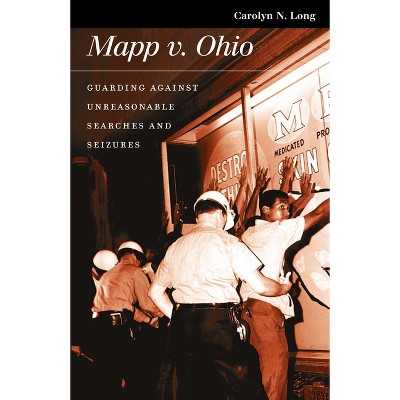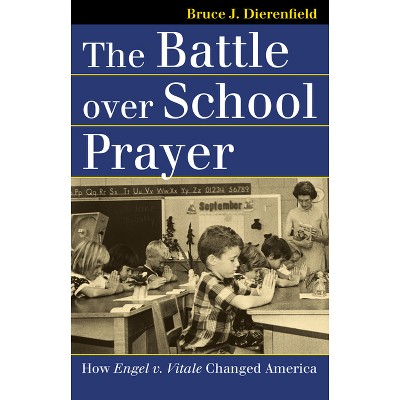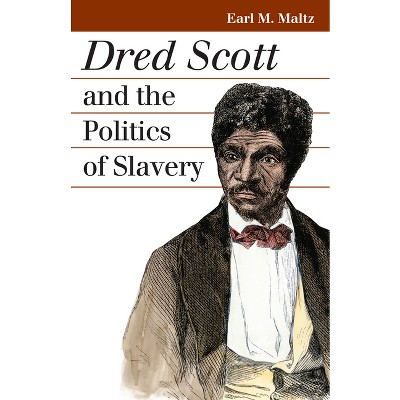Sponsored

Religious Freedom and Indian Rights - (Landmark Law Cases & American Society) by Carolyn N Long (Paperback)
In Stock
Sponsored
About this item
Highlights
- The Supreme Court's controversial decision in Oregon v. Smith sharply departed from previous expansive readings of the First Amendment's religious freedom clause and ignited a firestorm of protest from legal scholars, religious groups, legislators, and Native Americans.
- Author(s): Carolyn N Long
- 336 Pages
- Freedom + Security / Law Enforcement, Constitutional
- Series Name: Landmark Law Cases & American Society
Description
Book Synopsis
The Supreme Court's controversial decision in Oregon v. Smith sharply departed from previous expansive readings of the First Amendment's religious freedom clause and ignited a firestorm of protest from legal scholars, religious groups, legislators, and Native Americans. Carolyn Long provides the first book-length analysis of Smith and shows why it continues to resonate so deeply in the American psyche. In 1983, Klamath Indian Alfred Smith and his co-worker Galen Black were fired as counselors from a drug rehabilitation agency for using peyote, a controlled substance under Oregon law, in a religious ceremony of the Native American Church. Both were subsequently denied unemployment benefits, which the State of Oregon claimed was permissible under its police powers and necessary in its effort to eradicate drug abuse. But Smith and Black argued that the denial of unemployment benefits constituted an infringement of their religious freedom and took their cases to court. Long traces the tortuous path that Smith followed as it went from state courts to the Supreme Court and then back again for a second round of hearings. A major event in Native American history, the case attracted widespread support for the Indian cause from a diverse array of religious groups eager to protect their own religious freedom. It also led to an intense tug-of-war between the Court and Congress, which fought back with amendments to the American Indian Religious Freedom Act (to protect the religious use of peyote) and the Religious Freedom Restoration Act of 1993, which protected religious freedom for all Americans. The Court subsequently ruled the latter act unconstitutional in Boerne v. Flores (1997). Long provides a lucid and balanced view of the competing sides in Smith. Drawing on interviews with Smith and his family, as well as with lawyers, judges, and congressional and interest group representatives involved in this struggle between Congress and Court, she takes the reader from the rituals of a peyote religious ceremony to the halls of government to reveal the conflicting interests that emerged in this key First Amendment case. She also clarifies how the Court reversed longstanding precedent by replacing the balancing test of "compelling state interest" and "least restrictive means" with a new "reasonable basis" argument that theoretically could be used to curtail religious practices well beyond those of the Native American church. Ultimately, the Supreme Court ruled that the First Amendment protection of religious freedom applies only to laws that specifically target religious behavior and that an individual's religious beliefs do not excuse one from complying with statutes that indirectly infringe on their religious rights. Engagingly written, Long's study highlights the resultant struggles, but without ever losing sight of the rich human dimensions of the story.Review Quotes
"Long provides an excellent microstudy with broad application to legal and Native American history. The book is well written, clearly organized, and painstakingly researched and will attract the attention of scholars from a variety of academic fields."--Law and History Review
"Mingling Oregon drug policy, individual freedom, local personalities, and Native issues, this case has become the contemporary symbol of Native American religious freedom. A solid addition to Western legal history."--Journal of the West
"A highly commendable case study for reflecting upon how the law emerges out of conflict over cultural frameworks, political strategies, personal and professional interests, and institutional power."--Law and Politics Book Review
"Long's clear analysis of religious freedom claims, her discussion of the process of crafting legislation, her understanding of the special challenges faced by members of smaller religions, and her lively writing style combine to make Religious Freedom and Indian Rights a fine contribution to the study of religious freedom in America."--H-Net Reviews
"Long has penned an excellent history of events that led to the Religious Freedom Restoration Act of 1993 and PL 103-349, the 1994 amendment to the American Indian Religious Freedom Act."--Choice
"Carolyn Long nimbly analyzes the jumbled issues of religion, Native American rights, drug use, state authority, and congressional activism to produce an arresting analysis of one of the Supreme Court's landmark cases of modern religious liberty."--Kermit Hall, author of The Magic Mirror: Law in American History
"What makes this excellent book especially gripping is its human dimension: the actual people--and their networks of associations, including the Native American churches--behind the litigation."--Sanford Levinson, author of Constitutional Faith
"A superbly researched and carefully crafted history."--John R. Wunder, editor of Native Americans and the Law
Shipping details
Return details
Trending Non-Fiction











